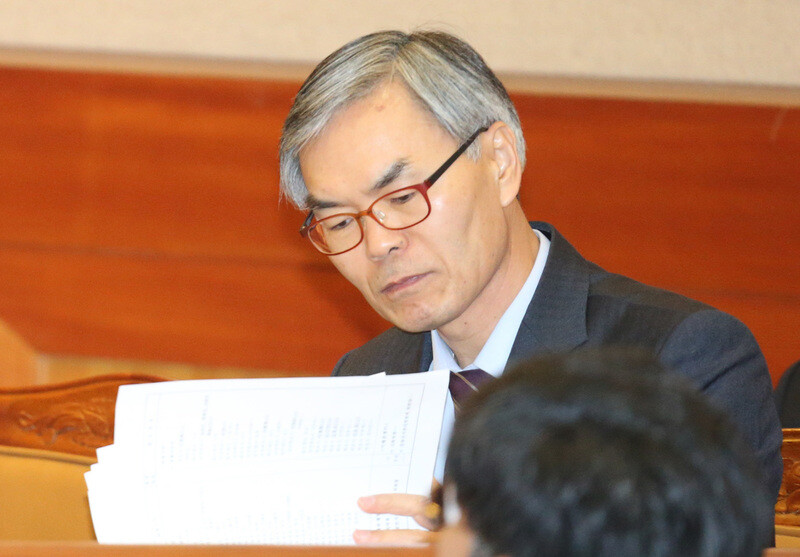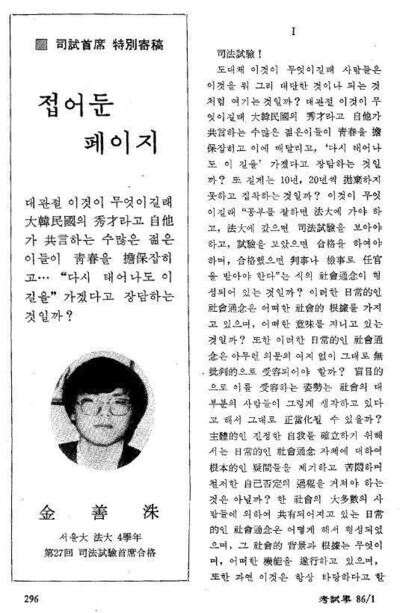hankyoreh
Links to other country sites 다른 나라 사이트 링크
New candidate for Supreme Court Justice may signal shift in court’s composition

Attorney Kim Seon-su, a 57-year-old graduate of the 17th Judicial Research and Training Institute (JRTI) class who has spent the last 30 years focusing on defending workers, has been recommended as a candidate to serve as a Supreme Court Justice. Of the 146 past and present members of the Supreme Court, not one “outsider” has been appointed without first serving with a court or the prosecutors. Observers are now looking at Kim’s recommendation as offering a new opportunity to diversify the court’s makeup, which has been criticized in the past not only for gender and alma mater bias but also for its domination by former senior judges.
Supreme Court Chief Justice Kim Myeong-su announced on July 2 that he had recommended to President Moon Jae-in that he nominate Kim, Jeju District Court chief Lee Dong-won (55, 17th JTRI class) and Supreme Court Library of Korea director No Jung-hee (54, 19th JTRI class) to replace current Justices Ko Young-han, Kim Chang-suk, and Kim Shin when they step down on Aug. 2.
Among the list of candidate Justices recommended, Kim Seon-su’s name definitely stands out. His recommendation is seen among court observers as the most surprising in the 13 years since the 2005 recommendation of Park Si-hwan, who had been a key figure in judicial upheavals.
“If Mr. Kim becomes a Supreme Court Justice, we’re like to see new perspectives and considerations reflected in decisions on labor cases, which have so far been more conservative,” a Supreme Court official said.
Indeed, Kim has availed himself of every opportunity in the past to complain that Supreme Court decisions have been more strongly influenced by civil than labor law. The Korean Bar Association has recommended Kim as a candidate to become a Supreme Court Justice four times in a row since July 2015, when the Park Geun-hye administration was in office.
The Korean Bar Association said that Kim “has long fought for vulnerable members of society” and emphasized “the need to diversify the composition of the judiciary.”
Born in Jinan, North Jeolla Province, Kim received the highest score on South Korea’s 27th bar exam in 1985, while he was a student at Seoul National University’s law school. While taking the test, Kim wrote, he “was thinking of Jeon Tae-il,” a labor advocate who famously set himself on fire in 1970.

Kim’s reflections on passing the bar exam, which were published in a monthly journal of legal affairs called Goshigye, are still talked about in the legal community today.
“When the established social order itself is structurally unfair, what exactly does it mean to achieve justice? In studying for the bar exam, perhaps we are so focused on interpreting positive law that we disregard the law’s social function, as well as the reasons and motivations for its enactment,” Kim wrote, before announcing that he had chosen to become a labor attorney, rather than a prosecutor or judge.
In 1988, Kim started his legal career at the law firm of the late Cho Jeong-rae, who wrote a critical biography of Jeon Tae-il. While at Cho’s firm, Kim mostly handled major labor cases: he represented 1,021 workers at Seoul National University Hospital trying to secure their legal benefits and public servants and golf club caddies seeking to set up labor unions.
In the legal and labor communities, Kim’s arguments are regarded as having largely established the framework of Supreme Court precedent regarding the status of workers at in-house subcontractors, the conditions for terminating workers, and the legal principles for “ordinary wages,” a term referring to the basic wages used to calculate overtime and other legally required payments.
Among the material that Kim has submitted to the Supreme Court, he wanted to particularly emphasize his experience as a member of the public interest committee in charge of judgments at the National Labor Relations Commission (between 2000 and 2005).
“While judging three cases each week, I experienced the difference between defending someone and judging them. My job was to make decisions from an impartial position,” he said, brushing aside concerns about his lack of experience as a judge.
Likely opposition from Liberty Korea Party
The Liberty Korea Party and other opposition parties are likely to oppose Kim’s nomination for Supreme Court justice because he served as the secretary for judicial reform in the office of the Blue House Senior Secretary for Civil Affairs under former president Roh Moo-hyun.
During a telephone call with The Hankyoreh, Kim explained that his secretarial responsibility under Roh had been “moving ahead with judicial reform as the head of the strategy and promotion team on the Judicial Institutional Reform Promotion Committee. Our decisions were made through votes in meetings attended by experts, and we were not under orders from the Blue House.”
If confirmed as Supreme Court justice, Kim says, he will “work to diversify the composition of the Supreme Court” in labor cases and others.
By Kim Nam-il, staff reporter
Please direct comments or questions to [english@hani.co.kr]

Editorial・opinion
![[Editorial] Intensifying US-China rivalry means Seoul must address uncertainty with Beijing sooner than later [Editorial] Intensifying US-China rivalry means Seoul must address uncertainty with Beijing sooner than later](https://flexible.img.hani.co.kr/flexible/normal/500/300/imgdb/original/2024/0517/8117159322045222.jpg) [Editorial] Intensifying US-China rivalry means Seoul must address uncertainty with Beijing sooner than later
[Editorial] Intensifying US-China rivalry means Seoul must address uncertainty with Beijing sooner than later![[Column] When ‘fairness’ means hate and violence [Column] When ‘fairness’ means hate and violence](https://flexible.img.hani.co.kr/flexible/normal/500/300/imgdb/original/2024/0516/7417158465908824.jpg) [Column] When ‘fairness’ means hate and violence
[Column] When ‘fairness’ means hate and violence- [Editorial] Yoon must stop abusing authority to shield himself from investigation
- [Column] US troop withdrawal from Korea could be the Acheson Line all over
- [Column] How to win back readers who’ve turned to YouTube for news
- [Column] Welcome to the president’s pity party
- [Editorial] Korea must respond firmly to Japan’s attempt to usurp Line
- [Editorial] Transfers of prosecutors investigating Korea’s first lady send chilling message
- [Column] Will Seoul’s ties with Moscow really recover on their own?
- [Column] Samsung’s ‘lost decade’ and Lee Jae-yong’s mismatched chopsticks
Most viewed articles
- 1[Editorial] Transfers of prosecutors investigating Korea’s first lady send chilling message
- 2[Exclusive] Unearthed memo suggests Gwangju Uprising missing may have been cremated
- 3[Column] US troop withdrawal from Korea could be the Acheson Line all over
- 4Xi, Putin ‘oppose acts of military intimidation’ against N. Korea by US in joint statement
- 5[Column] When ‘fairness’ means hate and violence
- 6[Editorial] Intensifying US-China rivalry means Seoul must address uncertainty with Beijing sooner t
- 7‘Shot, stabbed, piled on a truck’: Mystery of missing dead at Gwangju Prison
- 8Spotlight turns to Hyundai Group Chairwoman’s visit to North Korea
- 9[Column] Samsung’s ‘lost decade’ and Lee Jae-yong’s mismatched chopsticks
- 10[Column] Will Seoul’s ties with Moscow really recover on their own?